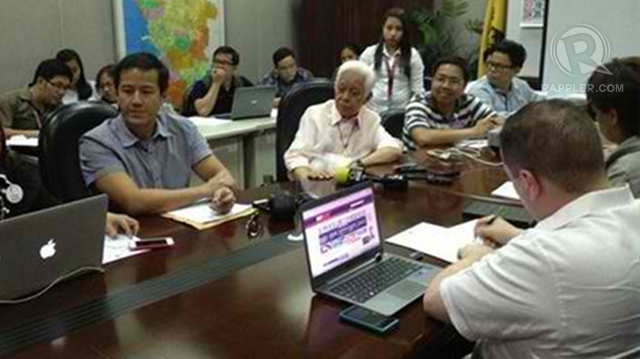SUMMARY
This is AI generated summarization, which may have errors. For context, always refer to the full article.

MANILA, Philippines – While he practiced election law for over two decades, Commission on Elections (Comelec) Chair Sixto Brillantes Jr, 72, admits difficulty setting rules for online campaigns.
Like Brillantes, the Comelec is 72. Also like him, the Comelec grapples with new media for the first time to check campaign expenses, admitting it may tone down on certain aspects of this “test case.”
In an interview with reporters on Monday, January 28, Brillantes said the Comelec may prioritize national campaigns when it comes to online expenses.
Brillantes, who tweets through the account @ChairBrillantes, said he feels social media “is more concentrated on national campaigns.”
“We might not use [the rules] much in the local campaign, [which lasts] 45 days. That’s why we want to come out with some rules now. I think this will apply more on the national – senatorial and party list – which will start already February 12,” Brillantes said.
While it will monitor all online campaigns, Brillantes said the Comelec will likely choose its battles. “Kung hindi naman masyadong malaki ang gastos, hindi na namin masyadong pag-iinitan ‘yon,” the chairman explained. (If the expenses aren’t that huge, we might not crack down on it as much.)
Brillantes also said the Comelec may also monitor PR firms that handle online campaigns.
On Monday afternoon, the Comelec held a roundtable discussion on online propaganda with bloggers, netizens, and other concerned groups. (Check Rappler’s live blog for more.)
The 2013 elections is the first time that the Comelec will monitor online propaganda.
In Resolution No. 9615, the Comelec sets recommended sizes and frequencies for online ads. But it is mum on regulating social media like Facebook and Twitter, a more fluid landscape compared to traditional set-ups that only require posters and ads for broadcast.
Open to compromise
Comelec Commissioner Christian Lim, who heads the Comelec’s campaign finance unit, said the poll body may compromise on “subjective” areas.
“Subjective” areas include subtle propaganda that use keywords and search engines. Some advertisers, for example, make their products appear more often in search results.
Lim said the Comelec, however, is confident it can monitor more explicit ads such as banners and pop-ups. (Watch more in the video below.)
“This is really a test case, 2013, because we’re looking at 2016. We don’t want a repeat of 2010, na grabe ‘yung, talagang wild ‘yung ano, no limits talaga,” explained Lim, who used to belong to the legal team of President Benigno Aquino III and his defeated running mate, Interior Secretary Mar Roxas. (We don’t want a repeat of 2010 that was really wild and had no limits.)
Deviating from past regulations, the Comelec’s campaign rules for 2013 have been contentious.
The Comelec, for instance, imposed huge cuts on candidates’ airtime limits – heeding the request of election watchdogs but threatening politicians who appeal for more broadcast exposure. The poll body, however, unanimously approved its new campaign rules to uphold the “spirit” of the Fair Elections Act, said Comelec Commissioner Rene Sarmiento. – Rappler.com
Related stories:
Add a comment
How does this make you feel?
There are no comments yet. Add your comment to start the conversation.